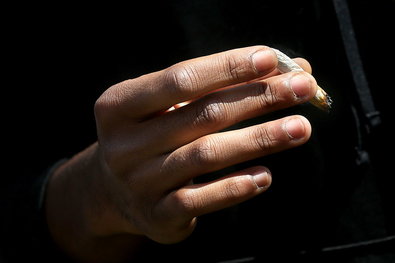
Is Marijuana a Gateway Drug?
The drive to marijuana legalization has grown more powerful as the crisis of heroin and opioid addiction has become more troubling. Now some officials say efforts to legalize marijuana should stop because, they say, greater availability would increase use and marijuana can be a gateway to the use of other drugs. But is marijuana a gateway drug and, for that reason, should it remain illegal?
* drive = (조직적인) 운동/ marijuana = 마리화나, 대마초/ legalization = 적법화, 합법화/ opioid = 오피오이드 (아편 비슷한 작용을 하는 합성 진통·마취제)/ addiction = 중독/ availability = 유용성; (입수) 가능성/ a(the) gateway to ~ = ~에 이르는 길/ illegal = 불법적인
 대마초가 다른 마약으로 가는 중간 마약이라면 그 이유로 불법으로 남아야 하나요?
대마초가 다른 마약으로 가는 중간 마약이라면 그 이유로 불법으로 남아야 하나요?
1. Marijuana Has Proven to Be a Gateway Drug
Establishing it as a third legal drug, along with tobacco and alcohol, will increase drug abuse, including the expanding opioid epidemic.
2. Overdoses Fell with Medical Marijuana Legalization
Medical marijuana might be safer for chronic pain management than opioids but more research is needed.
3. Fears of a Gateway Effect Vastly Exceed the Evidence
The vast majority of people who use marijuana never progress to using other illicit drugs, or even to becoming regular marijuana consumers.
4. Look at the Real Gateways to Addiction
Many promote myths about marijuana to justify the use of law enforcement and the testing of people for public benefits, jobs and exclusion from housing.
Sample Essay
Marijuana Has Proven to Be a Gateway Drug
It should come as no surprise that the vast majority of heroin users have used marijuana (and many other drugs) not only long before they used heroin but while they are using heroin. Like nearly all people with substance abuse problems, most heroin users initiated their drug use early in their teens, usually beginning with alcohol and marijuana. There is ample evidence that early initiation of drug use primes the brain for enhanced later responses to other drugs. These facts underscore the need for effective prevention to reduce adolescent use of alcohol, tobacco and marijuana in order to turn back the heroin and opioid epidemic and to reduce burdens addiction in this country.
Marijuana use is positively correlated with alcohol use and cigarette use, as well as illegal drugs like cocaine and methamphetamine. This does not mean that everyone who uses marijuana will transition to using heroin or other drugs, but it does mean that people who use marijuana also consume more, not less, legal and illegal drugs than do people who do not use marijuana.
People who are addicted to marijuana are three times more likely to be addicted to heroin.
The legalization of marijuana increases availability of the drug and acceptability of its use. This is bad for public health and safety not only because marijuana use increases the risk of heroin use.
A better drug policy is one that actively discourages marijuana use as well as other recreational drug use, especially for youth. The aggressive commercialization of marijuana that is now rampant and still growing is particularly damaging to the public health because it markets marijuana and an array of increasingly potent products in ever more attractive ways that encourage marijuana use and frequent high-dose THC use.
We are at a crossroads. Legalizing marijuana will have lasting negative effects on future generations. The currently legal drugs, alcohol and tobacco, are two of the leading causes of preventable illness and death in the country. Establishing marijuana as a third legal drug will increase the national drug abuse problem, including expanding the opioid epidemic.





![]() 대마초가 다른 마약으로 가는 중간 마약이라면 그 이유로 불법으로 남아야 하나요?
대마초가 다른 마약으로 가는 중간 마약이라면 그 이유로 불법으로 남아야 하나요?






